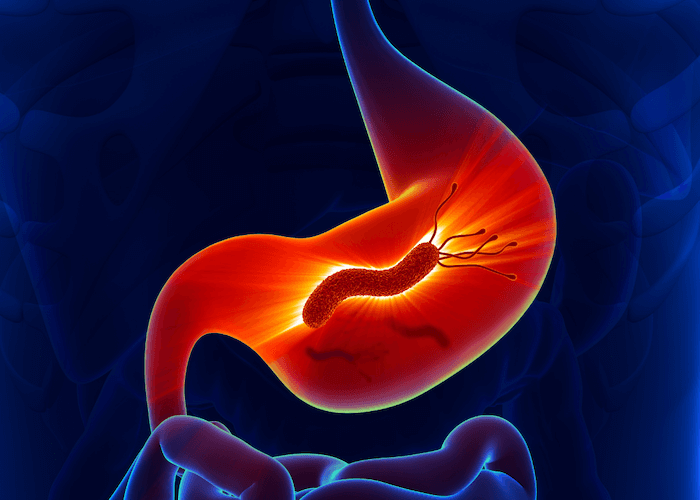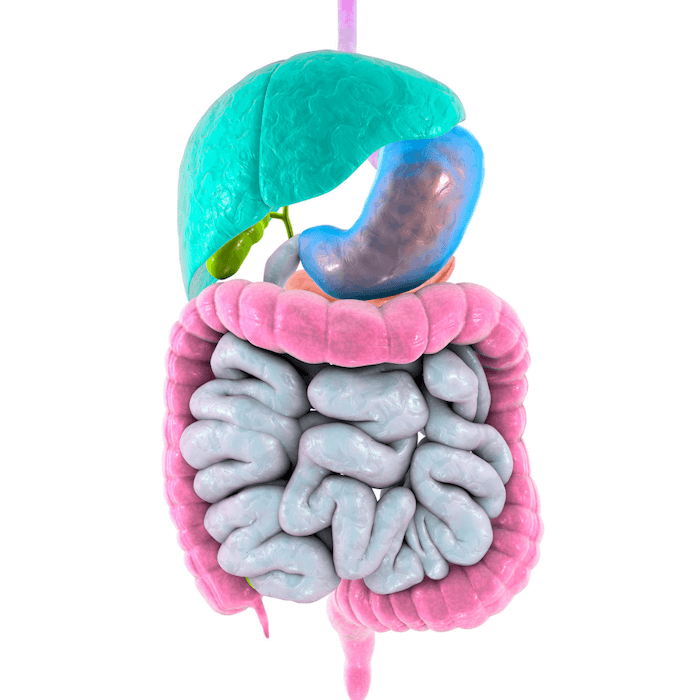Imagine… you’re sitting in class taking an exam, or waiting to be called into a job interview. You’re sitting in dead silence until… your stomach growls. Oh no, did everyone hear that? We’ve all been there! Maybe you haven’t eaten recently because you were cramming for the exam or preparing for the interview. These growling noises are actually the result of the migrating motor complex.
Most people have never heard of this before, so we wanted to dive into this topic to explain what the migrating motor complex (MMC) is, why it’s important, and how to enhance its function.
What is the Migrating Motor Complex?

The migrating motor complex (MMC) is responsible for moving material through our stomach and small intestine, cleaning house between meals or during sleep.
It is active during fasted states in order to push any undigested residues through the upper GI tract and into the large intestine to prepare a clean slate for your next meal.
This housekeeping role is essential because it reduces the chances of bacterial overgrowth. Without the complete removal of any leftover food within your system, bacteria have a chance to gorge on your meal. This can potentially lead to small intestine bacterial overgrowth (SIBO).
Migrating Motor Complex Stimulation
The MMC has multiple phases with varying strengths of contractions. But what stimulates the contractions to begin with?
The first section of the small intestine, the duodenum, is responsible for regulating the gastric contractions of the migrating motor complex by producing motilin when the duodenum is devoid of food.

Any nutrients present in the duodenum will suppress the release of motilin, preventing the peak contractions from occurring. This is why spacing out your meals is important – grazing throughout the day can actually halt the migrating motor complex and inhibit it from effectively clearing out your system.
The accumulation of digestive juices in the duodenum increases pressure, which stimulates the release of serotonin. Serotonin further increases the pressure, leading to even more serotonin release, which leads to more pressure, which leads to… you can probably see where this is going!
This positive feedback mechanism reveals that more gastric, pancreatic, and bile secretions are associated with higher migrating motor complex activity. These secretions also aid in cleansing the small intestine by preventing bacteria accumulation. So you can imagine that a lack of any of these secretions could lead to an ineffective MMC and bacterial overgrowth.
The MMC and the Gut-Brain Connection
The vagus nerve is responsible for stimulating the migrating motor complex and supporting normal digestion and elimination. This nerve innervates nearly all of the organs in our torso with parasympathetic (rest and digest) impulses. While sleeping, the vagus nerve is most active because this is the time we are most relaxed and in a parasympathetic, unstressed state.
So you can imagine that when the vagus nerve is inactive, under-stimulated, or damaged, that this can cause a lot of issues with many organs in the body. Stress of any kind can send your body into a fight-or-flight, sympathetic response that deactivates the vagus nerve functions.
This is a huge problem because our bodies were designed to exhibit these stress responses when we encounter threats to our lives – not for the everyday stressors that exist in modern society.
Migrating Motor Complex Disorder
Food poisoning is often a cause of migrating motor complex dysfunction. These pathogenic bacteria that enter the small intestine through the stomach can release toxins that cause damage to the vagus nerve, preventing the MMC from working effectively to sweep material – including the pathogenic bacteria – through your digestive tract. The stasis of food and bacteria in the GI tract can lead to further issues, such as diarrhea, constipation, and SIBO.
Traumatic brain injuries, whether they are as mild as hitting your head on something or as severe as a car accident or concussion, can also be a cause of migrating motor complex dysfunction. Due to the gut-brain connection, any injury to the brain could trigger glitches in the migrating motor complex.

Chronic stress is another – and possibly the most common – culprit of MMC complications. We all encounter stress in our daily lives… this could be stress from work, relationship problems, or overlapping layers of uncertainties about the future. No matter the source of stress, our bodies are automatically reacting in the same ways – in order to ensure our survival.
In reality, these responses are maladaptive to our current lifestyles. Most of us aren’t facing a fight to the death with a lion on a daily basis, but our bodies are still responding as if we are! The stress response turns off the vagus nerve and shuts down the migrating motor complex, both of which only work when we are in a relaxed, parasympathetic state.
Most of us spend more time in a sympathetic state than our bodies were designed for, and it directly affects our digestive functions. Any issue in your digestive functioning can cause even MORE stress… and it becomes a vicious cycle.
Tips for Enhancing Migrating Motor Complex Function
1. Space out your meals

Since we know that the migrating motor complex slams on the brakes the minute we eat something, it makes sense that spacing out meals would be effective in enhancing migrating motor complex function. This also means that constant snacking is often a no-go if you are experiencing issues with digestion.
Eating one nutritionally balanced meal every 3-4 hours is usually recommended to ensure that the migrating motor complex’s housekeeping roles can be completed before you become hungry again.
Fasting overnight is something most of us do without thinking about, and it’s also something that is critical for optimal digestive function. Not eating between your last meal/snack of the day and breakfast should be relatively simple, because the majority of that time you are sleeping (hopefully!).
Giving your system a 12-hour overnight break from processing foods can guarantee that the migrating motor complex has plenty of time to fulfill its housekeeping duties.
2. Support your stress response

Addressing the stress in our lives is often the first step to eliminating digestive issues. Eliminating certain stressors that you encounter frequently is always a good place to start. However, sometimes it isn’t possible to completely remove a stressor from your life. This is where stress management comes into play.
Things like yoga, mindfulness, meditation, deep breathing, and other relaxation techniques are useful in lowering stress hormones, like cortisol. Training your body with relaxation techniques allows you to more easily get into a parasympathetic state.
You can also support your stress response by using adaptogenic herbs and following an adrenal supplement protocol in coordination with your functional medicine dietitian. All of these things help tone down stress responses and improve vagus nerve function, leading to better digestion.
3. Try prokinetics
Prokinetics are supplements that stimulate the migrating motor complex by promoting movement through the digestive system. Prokinetics include supplements such as medicinal bitters, ginger, and 5-HTP. Before taking anything, you should speak with your functional medicine dietitian to figure out the right support you need.
The MMC is essential for clearing out our digestive tract of any undigested materials and bacteria, eventually resulting in their elimination from the body. This process is absolutely necessary to prevent uncomfortable symptoms like gas and bloating, and to avoid more serious problems like IBS and SIBO.
Taking the steps to improve your migrating motor complex function today will help you acquire and maintain a healthy gut and relieve you of any gastrointestinal distress.
Schedule your appointment today for personalized tips for improving your gut health!



